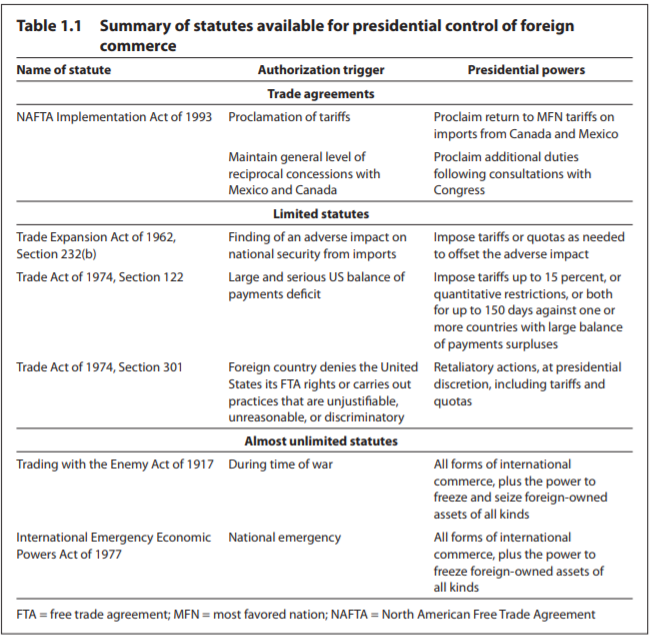New Fed Chairman Powell had just finished his Senate testimony. Market participants were digesting the morning’s economic data and the likely Fed reaction.
Then…something happened. Normally I am skeptical of the post hoc analysis of market moves, but this one was clear. President Trump announced the intention to raise tariffs on steel and aluminum. Stocks for those companies moved higher. Stocks steel and aluminum consumers moved lower – much lower – as did the entire market. Unlike most market moves, the causation was obvious.
With Thursday's stock declines added to those of the two days preceding, many investors are paying attention. I want to do a factual analysis of the situation, and then venture some suggestions for investors.
Can the President Do This?
Simply put, yes. Congress has delegated very broad powers to the President. Even when policy is shifting, requirements are for consultation, not formal approval. If the President invokes a national security threat, the authority is even greater.
The Congressional Research Service analyzed the powers, noting the potential for challenges in court. Perhaps, but the inherent delay in that process would render this response irrelevant.
The Peterson Institute analyzed these powers before the election. This table provides a nice summary.

What are the Economic Issues?
The key question relates to the costs and benefits of free trade for a particular country. Wikipedia may not be the leading source on economics, but the basic story is often both clear and accurate. Here is the entry on the key concept underlying free trade:
David Ricardo developed the classical theory of comparative advantage in 1817 to explain why countries engage in international trade even when one country’s workers are more efficient at producing every single good than workers in other countries. He demonstrated that if two countries capable of producing two commodities engage in the free market, then each country will increase its overall consumption by exporting the good for which it has a comparative advantage while importing the other good, provided that there exist differences in labor productivity between both countries.[5][6] Widely regarded as one of the most powerful[7] yet counter-intuitive[8] insights in economics, Ricardo’s theory implies that comparative advantage rather than absolute advantage is responsible for much of international trade.
There is no principle in economics that is more widely accepted by those who have studied the subject.
What are the Political Issues?
The trade issue lends itself to a phenomenon that I call “perception dichotomy.” One side of the issue seems obvious while the other is more nuanced. It is easy to see the impact on the producer companies – losses to foreign markets with consequent declines in jobs. The impact on consumers is much more difficult to grasp. It is not just higher prices. It can be the loss of sales to businesses who can no longer compete after dealing with higher (steel?) raw material prices.
The immediately affected industries are easy to spot, easy to visit for photo ops, and easy to quantify in terms of jobs. The diffuse effect on consuming industries is more difficult.
Traditionally, Democrats have used the anti-free trade argument while Republicans have endorsed the overall economic benefits of trade agreements. Bill Clinton crossed this line, forging some bipartisan agreements.
A switch in international trade posture is also a switch in the traditional party alignment.
What Will Happen?
Making this kind of forecast is always treacherous, but the forces here are clear-cut. The economic theory is widely and tangibly appreciated by consumers of steel and aluminum. I expect the President to back off from Thursday's pre-announcement. It will be a trial balloon, a cheap thrill, an easy claim to a news cycle.
Please note! This is not a criticism of the President or his team. If I were advising him, I might suggest a similar approach. How different is this from the “DACA agreement” which quickly disappeared, or the surprising reversal on gun control?
Floating trial balloons can be an effective ploy.
Investment Implications
Before this announcement, I had been considering some steel stocks, but they popped too much on this (questionable?) news.
The combined Trump/Powell meme was stagflation – the opposite of what I expect. The President may well achieve some negotiation triumphs with China, Canada, and Mexico, but these will not feature big tariffs. The overall economic prospects remain strong, so I like the stocks that were unfairly punished in Thursday's selling. One example is Cummins, Inc. (NYSE:CMI) which I bought near the close. There are other good, similar choices for those who understand the overall strength of the economy and corporate earnings.
